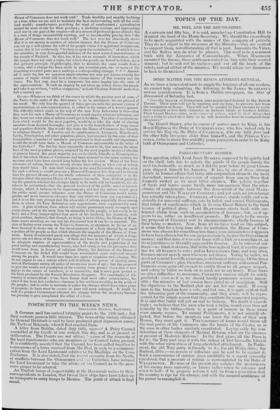PARLIAMENTARY REFORM.
THIS question, which Lord JOnN RUSSELL supposed to he quietly laid on the shelf, bids fair to agitate the minds of the people during the next twelvemonth, as much as it did the year before its great Cham- pion shipped himself for America.. It has, by one of those strange whirls in human affairs that bring into conjunction elements the most discordant, renewed an accession of support from among those that formerly ranked as its most bitter enemies. The yoking together of tigers and lambs seems hardly more incongruous than the inter- change of compliments between the descendant of the great MARL- BOROUGH and Mr. WILLIAM COB B ETT ; and yet such an interchange has actually taken place. COBBETT, of course, stands boldly and con- sistently for universal suffrage, vote by ballot, mid annual Parliaments, that trinity of excellencies which is to raise Great Britain to the third heaven of political glory. Lord BLANDronu starts back with un- feigned alarm from such an accumulation of horrors ; but, as it ap- pears to us, rather on insufficient grounds. He objects to the sweep- ing proposal of CORBETT and its accompaniments, chiefly because of their being so modern. Now, from all we have read on this subject, it seems that for a long time after its institution the House of Com- mons was chosen for something less than a year, inasmuch as it appears to have been chosen but for one 'impose, namely, to give the Government money; and that done, it was smt home with a kick or a compliment, as its niggardliness or liberality appeared to deserve. As to universal suf- frage—we think it obvious, that in the boroughs at least, it was the prac- tice for all freemen to vote ; and in LEICESTER'S time, and long after, freemen meant merely men who were not slaves. Voting by ballot, we need not remind Lord BLANDFORD, is of classical authority. Of the three parts of COBB ETT'S plan, therefore, unWersal suffrage and annual Par- liaments seem quite old enough to entitle them to all proper respect, and voting by ballot we look on as aged, not to say hoary. Were there no other difficulties to overcome, COBB ETT.S success might be safely predicted : even as it is, we should hardly pronounce success impos- sible the miracles of last session have cured us of scepticism. Still the objections to the Radical plan are not few nor small. If every man in the kingdom have a vote, and but one, it is quite evident that the labouring part of the community, and they alone, will be repre- sented, for the simple reason that they constitute the numerical majority. It is said that ballot will put an end to bribery. We doubt it exceed- ingly; we believe that the man who took a bribe, would even then act honestly by the briber—there is a point of honour in these cases even among rogues. To annual Parliaments, it is not unfairly ob- jected, that before the members can learn the rules of their own House, they must quit it. This ignorance of forms would throw all the real power of the Commons into the hands of the Clerks, as is the case in other bodies similarly constituted. Laying aside the con- sideration of these elements of Radical Reform, what are the chances at present of Moderate Reform ? In the first place, all the Press is for it : the Tory part urge it with the ardour of first love—the Liberal with the sober earnestness of long-cherished attachment. In Parlia- ment, the old Tory party is friendly to it ; the old Whig, ditto ; the Radical, ditto ;—no person of influence can be said to be against it. Such a concurrence of opinion gives credibility to a report generally circulated, that a measure of reform is contemplated by the Duke of WELLINGTON. No man of the present day watches the manoeuvres of his enemy more narrowly, or knows better when to advance and when to halt : if he propose reform it will be from a conviction that the country is ripe for the change, and with the assured confidence of his power to accomplish it. g.


















 Previous page
Previous page